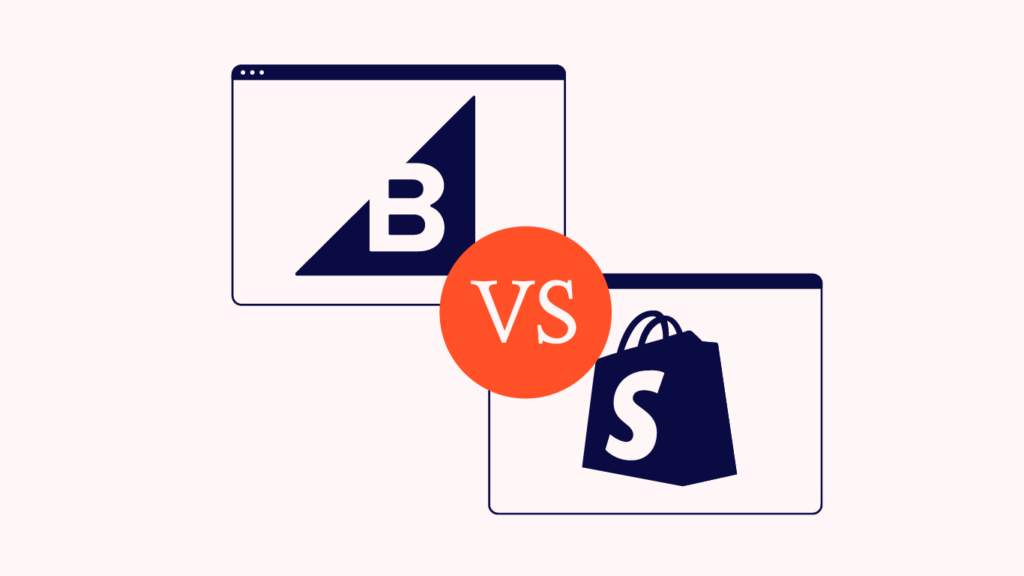The classic BigCommerce vs. Shopify debate.
You're launching an ecommerce shop, and you're asking, should I use BigCommerce or Shopify? Which one is better to meet the needs of your business and enhance sales for your ecommerce store?
Both Big Commerce and Shopify are good products, but there are differences in their platforms that may make one better for your business’s specific circumstances. Here’s how to make sure you’re choosing the right ecommerce giant for your online store website and reap the benefits of ecommerce.
What is Shopify?
Shopify is a platform for ecommerce. Shopify is for small to medium businesses while the Shopify Plus plan works for large ones. Both work the same and mostly have the same functionality but Shopify Plus can handle significantly more online interactions. It is a platform for large and growing online shops that takes care of the development and site maintenance so you can focus on the shop itself. Shopify Plus is a hosted SaaS platform that gets you up and running so you can focus on marketing rather than the site details.
What is BigCommerce?
BigCommerce is a platform similar to Shopify, an ecommerce platform for businesses of all sizes. Enterprise is the side of the business focused on high-volume brands. It manages high volume transactions and business traffic and is aimed at companies at over $1 million in annual sales. This is a solid SaaS platform that offers almost perfect uptime and support in busy times.
BigCommerce vs Shopify: Side-by-Side Comparison
When deciding which ecommerce platform to use for your large business, you should be as informed as possible. There are lots of details to consider before choosing between buying into either Shopify Plus or BigCommerce Enterprise.
Comparison of Shopify and BigCommerce Features
Both companies are SaaS (Software as a Service) meaning they are completely hosted cloud-based software and the only things you need as a user are a computer, an internet connection, and a current web browser.
BigCommerce vs Shopify: dashboards
Dashboards for both platforms are easy to use and allow you to add products, go through reports, and edit themes without any hassle. Shopify has its own coding language but it is easy to learn while BigCommerce tends to be out-of-the-box ready. Both offer free trials with no fear of committing.
BigCommerce vs Shopify: conversions
One of the areas where the platforms differ is in the area of conversion. BC is very focused on this area. They use a filtered search to quickly help customers find exactly what they’re looking for in your online store which means they tend to buy fast as well. BC also provides immediate shipping quotes. While Shopify certainly keeps up with this, they don’t have the one-page checkout that BC has. Quick and done means faster, more efficient sales.
BigCommerce vs Shopify: web design
The other area you should compare is web design. Both platforms have responsive mobile web designs. Shopify has ten themes but you can pay for more that might be more dynamic. On the other hand, BC offers over 400 options to choose from when you are using the online store builder. Shopify is certainly ahead of the two with drag and drops design but BC is not far behind when it comes to looks.
BigCommerce vs Shopify: payment processing
Another area of comparison is how payments are processed. The platforms are evenly matched as they use great processors such as PayPal or Sage. They each have deals that can reduce transaction rates based on use. To see which is best, you would have to do a step-by-step comparison based on transactions but they both have ways to reduce those overall costs.
BigCommerce vs Shopify: support
While you are working on your site or if you have issues when you are alive, good tech and customer support are very important. While both platforms have solid support for those setting up ecommerce solutions, Shopify has a specially routed line for those with a Shopify Plus plan. You’ll work with a Merchant Success manager to support your company at no cost. You can get similar support at BC but there are additional charges.
Shopify Pricing Vs. BigCommerce Pricing
Comparing the Shopify and BigCommerce pricing isn’t straightforward as definitive pricing just by my inquiry isn’t available. If you ask, “How much does Shopify cost?”, you are not going to get a clear answer. Shopify charges monthly costs that begin at around $2,000 per month and BigCommerce at $1,000 but this is all flexible as it really depends on what your business needs are and how big it is. Every store is different. You will also find some extra fees for Shopify themes but that may be balanced by BigCommerce’s extra costs for specialized customer service.
Shopify Plans vs BigCommerce Plans
While pricing seems quite different, the plans offered vary greatly simply depending on how fees are implemented on transactions. Fees can increase based on the volume of sales (GMV-Gross merchant volume) and the storefront. You also need to consider payment services and hosting costs.
Why Use Shopify?
Choosing to use Shopify Plus means you are getting great customer service along with a business that has been established for years that’s specifically designed for large brands. Building a site is simple and flexible and you can choose the themes or upgrades you want. They know the big ecomm business and will get your ecommerce store live quickly. You may opt for a Shopify alternative but keep in mind that you may be sacrificing usability, customer service, and enterprise-grade capabilities in doing so.
Why Use BigCommerce?
BigCommerce Enterprise is newer to the ecomm market than Shopify Plus but it has a lot to offer. Pricing is competitive and its one-page checkout is a huge bonus when it comes to conversions. Easy setup and quick sales are a top reason to choose this platform. The dashboard is easy to use and BigCommerce SEO is consistently offered throughout the process so you can pick and choose what works for your ecomm site.
Need expert help selecting the right eCommerce Solutions Software?
If you’re struggling to choose the right software, let us help you. Just share your needs in the form below and you’ll get free access to our dedicated software advisors who match and connect you with the best vendors for your needs.
Final Thoughts
Choosing an ecommerce shopping platform is not something to take likely. It is a substantial amount of money spent on something that is going to drive your business sales. Help can be found at The Ecomm Manager Newsletter. The more research and insight you can get into building successful online retailers, the more informed your decision will be.
Considering open source ecommerce platforms? Here are the 10 Best Open Source Ecommerce Platforms



